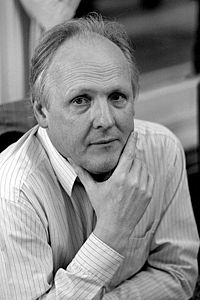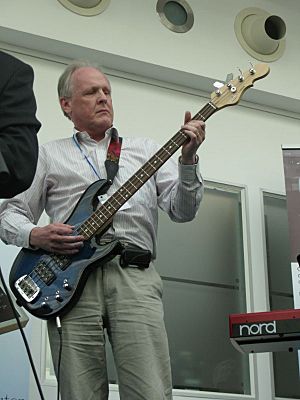Steve Furber facts for kids
Quick facts for kids
Steve Furber
|
|
|---|---|

Furber in 2009
|
|
| Born |
Stephen Byram Furber
21 March 1953 Manchester, England
|
| Education | Manchester Grammar School |
| Alma mater | University of Cambridge (BA, MMath, PhD) |
| Known for |
|
| Spouse(s) |
Valerie Margaret Elliott
(m. 1977) |
| Awards |
|
| Scientific career | |
| Fields |
|
| Institutions |
|
| Thesis | Is the Weis-Fogh principle exploitable in turbomachines? (1979) |
| Doctoral advisor | John Ffowcs Williams |
| Doctoral students | Nigel Paver, Shiv Sikand, Craig Farnsworth, David Jackson |
| Other notable students | Simon Segars |
Stephen Byram Furber (born 21 March 1953) is a British computer scientist and engineer. He is a professor at the University of Manchester. He is famous for helping to create the BBC Micro computer and the ARM processor.
The ARM processor is a special kind of computer chip. It is designed to be small and use very little power. Because of this, it's perfect for devices that run on batteries. Over 250 billion ARM chips have been made. They are used in most of the world's mobile devices, from smartphones and tablets to smartwatches and servers.
In 1990, Furber moved to the University of Manchester. There, he began working on computers that are inspired by the human brain. His current project, called SpiNNaker, is a massive computer that uses one million ARM processors to copy how brain cells work.
Contents
Early Life and Education
Steve Furber was born in Manchester, England. He was very good at math from a young age. In 1970, he even won a bronze medal for the United Kingdom at the International Mathematical Olympiad, a worldwide math competition for high school students.
After high school, he went to the prestigious University of Cambridge. While studying for his PhD in the late 1970s, he started helping out at a new company called Acorn Computers. He worked on fun projects, like a controller for a fruit machine. He also helped build the first prototype of the BBC Micro computer.
Career and Major Projects
After finishing his PhD in 1981, Furber joined Acorn Computers full-time. The company had just won a contract to build a computer for the BBC, a British broadcasting company. This computer would help teach people all over the UK about programming.
The BBC Micro and ARM Processor
Furber was a key designer for the BBC Micro. This computer became very popular in schools across Britain in the 1980s. It helped a whole generation of kids learn how to code.
While at Acorn, Furber and his team, including Sophie M. Wilson, also designed a new kind of microprocessor called the ARM processor. ARM stands for Acorn RISC Machine. A microprocessor is the "brain" of a computer. The ARM processor was special because it was simple, fast, and used very little electricity. This design turned out to be a huge success. Today, ARM chips power most of the world's smartphones and other portable gadgets.
SpiNNaker: A Brain-Like Computer
In 1990, Furber became a professor at the University of Manchester. He wanted to explore new ideas in computing. His most famous project there is called SpiNNaker, which stands for Spiking Neural Network Architecture.
The goal of SpiNNaker is to build a computer that works like the human brain. Instead of running programs one step at a time like a normal computer, SpiNNaker copies the way brain cells, called neurons, send signals to each other.
The finished SpiNNaker machine is huge. It uses one million ARM processors all working together. It can model about one billion neurons, which is about 1% of the neurons in a human brain. By studying how SpiNNaker works, scientists hope to learn more about how our own brains function. They also hope to discover new ways to build more powerful and efficient computers.
Awards and Recognition
Steve Furber has received many awards for his work.
- In 2002, he was elected a Fellow of the Royal Society, one of the highest honors for a scientist in the UK.
- In 2008, he was appointed a Commander of the Order of the British Empire (CBE) by the Queen for his services to computer science.
- In 2010, he won the Millennium Technology Prize for his role in developing the ARM processor.
- In 2022, he won the Charles Stark Draper Prize, often called the Nobel Prize for engineering. He shared this award with the other creators of the modern computer chip.
His work has been so influential that a school in Manchester named one of its houses "Furber" in his honor. He was also featured in a 2009 BBC movie called Micro Men, which told the story of the rivalry between Acorn Computers and Sinclair Research in the 1980s.
Personal Life
Steve Furber is married and has two daughters and three grandchildren. When he's not designing computers, he enjoys playing the bass guitar.
 | Audre Lorde |
 | John Berry Meachum |
 | Ferdinand Lee Barnett |


